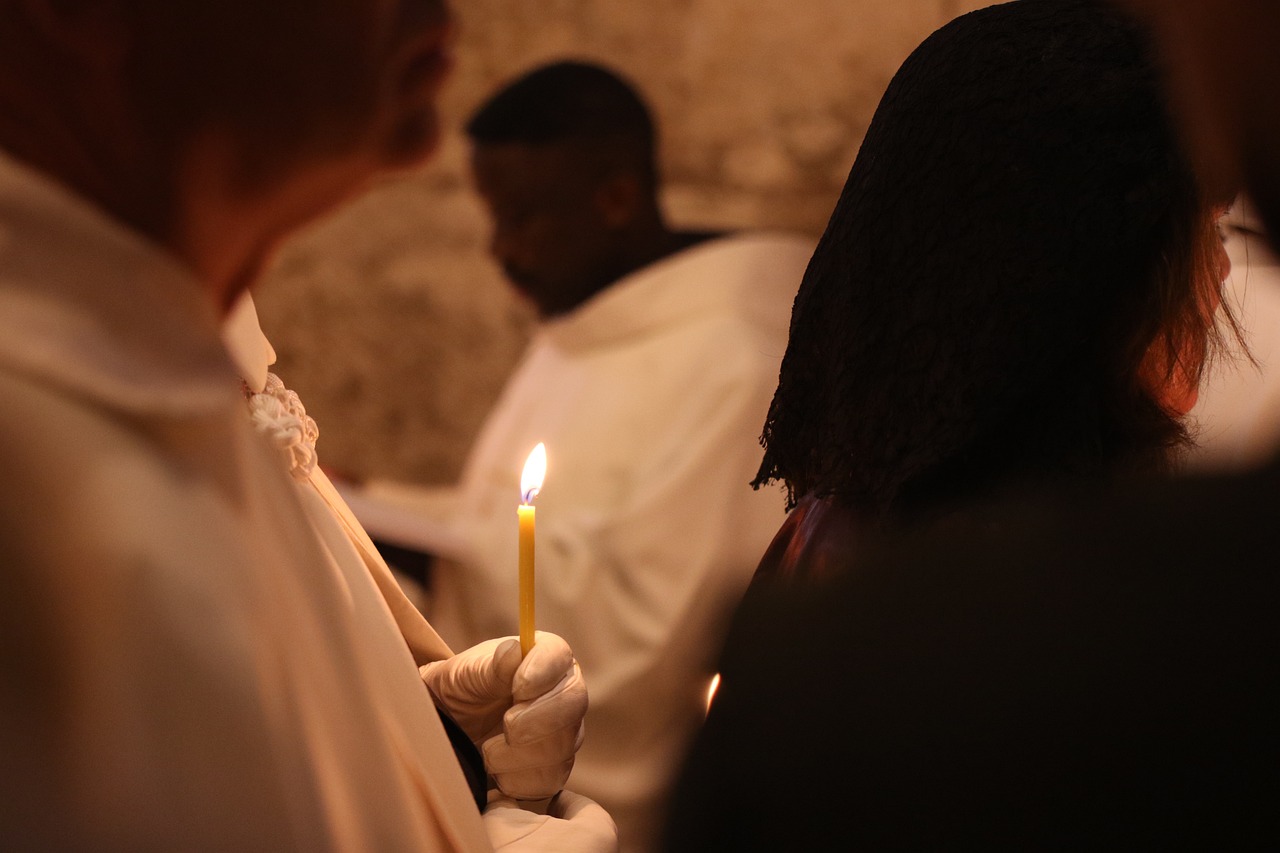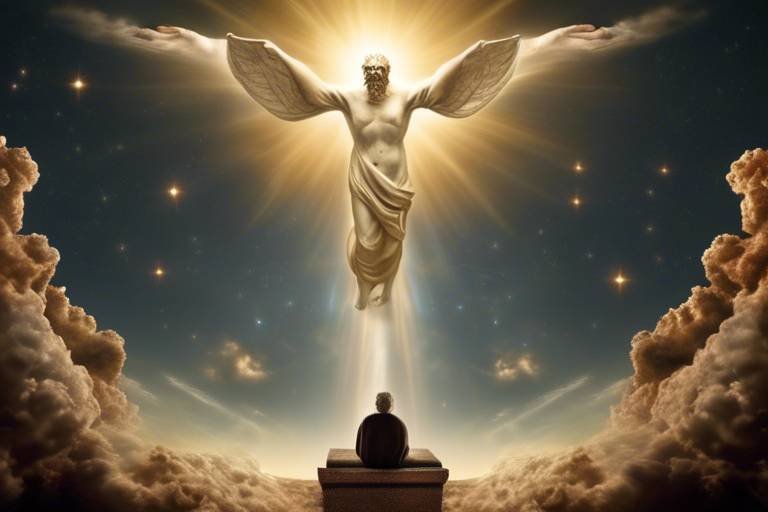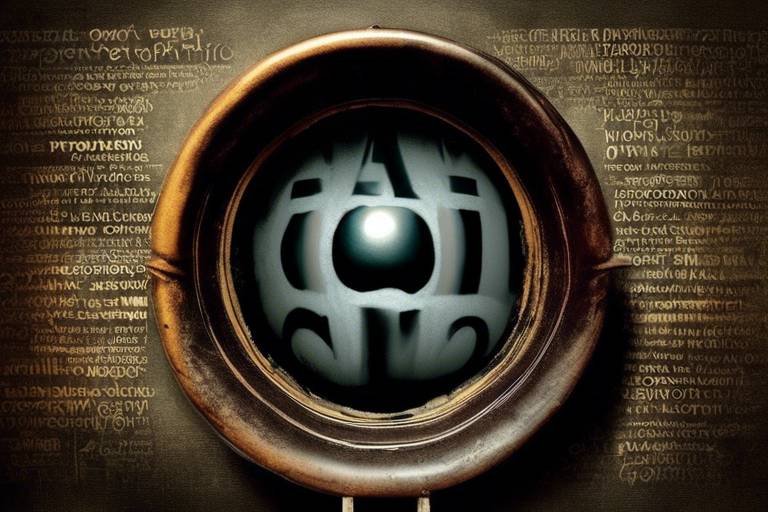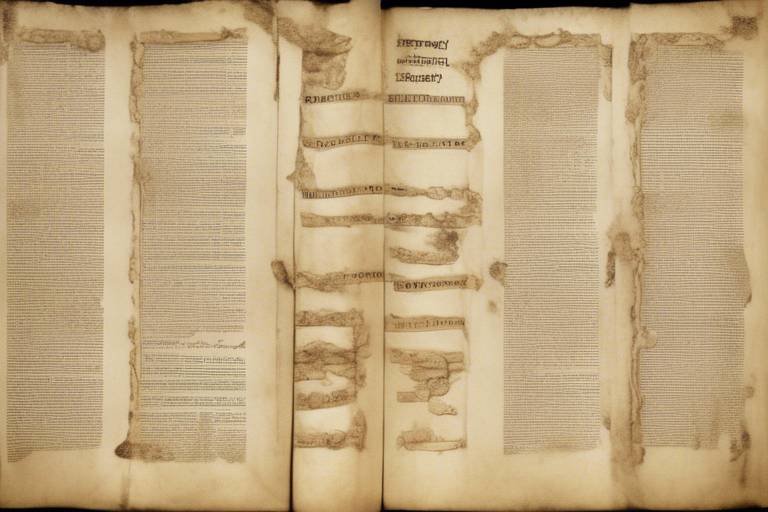Exploring Ontological Arguments for God's Existence
The quest for understanding whether God exists has intrigued humanity for centuries. Among the various philosophical approaches, ontological arguments hold a unique place. These arguments, rooted in the concept of being and existence, seek to establish God's existence through reason alone. Imagine trying to prove the existence of something not through physical evidence, but by defining it in such a way that its existence becomes a necessity. This article delves into the philosophical foundations of ontological arguments, examining their historical context, key proponents, and the implications of their claims regarding the existence of God.
Understanding the historical context of ontological arguments is crucial. The origins of these arguments can be traced back to the medieval period, particularly to the works of St. Anselm of Canterbury in the 11th century. Anselm's reflections laid the groundwork for what would become a significant area of philosophical inquiry. However, he wasn't alone in this intellectual journey. Thinkers like René Descartes and later philosophers contributed to the evolution of these arguments, each adding their own twists and interpretations. By exploring the evolution of these ideas, we can appreciate how ontological arguments have adapted over time and continue to spark discussion in contemporary philosophy.
The discussion surrounding ontological arguments is rich with influential philosophers. Anselm, Descartes, and Kant are among the most notable figures who have championed these arguments. Each brought a unique perspective that shaped the discourse. For instance, Anselm's argument centers on the definition of God as "that than which nothing greater can be conceived." This definition becomes the foundation for his argument, leading to a logical deduction of God's existence. In contrast, Descartes expanded upon Anselm's ideas, offering his own version that emphasized the perfection of God as a necessary being. Kant, on the other hand, critiqued these notions, arguing that existence is not a predicate. Understanding their contributions provides insight into the evolution of these arguments over time.
Anselm's formulation of the ontological argument is foundational and often considered the starting point for discussions about God's existence. He defines God as the greatest conceivable being, positing that if God exists in the mind, He must also exist in reality; otherwise, a greater being could be conceived. This logical deduction is powerful and has influenced subsequent philosophical thought significantly. Anselm's argument is not merely an abstract exercise; it challenges us to think about the nature of existence itself and the qualities we attribute to a supreme being.
However, Anselm's argument has faced numerous critiques. Philosophers like Gaunilo and Kant have raised objections that challenge the validity of Anselm's reasoning. Gaunilo, a contemporary of Anselm, famously argued that one could conceive of a perfect island, but that doesn't mean such an island exists. Kant, on the other hand, contended that existence is not a property that can be attributed to a being, thus undermining Anselm's conclusion. These critiques highlight the complexities involved in ontological arguments and the ongoing debates surrounding them.
Contemporary philosophers have revisited Anselm's argument, offering modern interpretations and adaptations. Some have sought to refine Anselm's original ideas, addressing historical critiques while reaffirming the argument's relevance. For example, modern versions may incorporate insights from modal logic, suggesting that if it is possible that God exists, then He must exist in some possible world, and consequently, in our world as well. This evolution demonstrates that ontological arguments are not static; they continue to develop and adapt in response to new philosophical challenges.
René Descartes expanded upon Anselm's ideas, presenting his own version of the ontological argument. Descartes argued that the very idea of a perfect being implies existence, as a God that does not exist would be less perfect than one that does. This reasoning adds a layer of complexity and depth to the ontological discourse. Descartes’ contributions not only reinforced the foundations laid by Anselm but also opened the door for further philosophical inquiry into the nature of existence and perfection.
The ontological argument continues to spark debate among philosophers today. Current perspectives vary widely, with some defending the argument's validity while others remain skeptical. Modern philosophy engages with traditional arguments in a way that challenges long-held beliefs and encourages fresh interpretations. This ongoing dialogue reflects the dynamic nature of philosophical inquiry and the profound implications these arguments have on belief in God.
The implications of ontological arguments extend beyond mere existence. They influence discussions about the nature of reality, existence, and the concept of perfection in philosophy. For instance, if we accept that God exists as the greatest conceivable being, what does that say about the nature of our reality? Furthermore, how does this understanding shape our moral and ethical frameworks? These questions reveal the profound impact ontological arguments have on our worldview and the philosophical landscape.
While ontological arguments are significant, alternative arguments for God's existence exist. These include cosmological arguments, which posit that everything that exists has a cause, and teleological arguments, which argue for the existence of a designer based on the complexity of the universe. Each of these arguments offers unique contributions to the discourse on God’s existence and invites us to consider the various ways in which we seek to understand the divine.
- What is the ontological argument? The ontological argument is a philosophical reasoning that attempts to prove God's existence based on the definition of God as the greatest conceivable being.
- Who first proposed the ontological argument? The ontological argument was first proposed by St. Anselm of Canterbury in the 11th century.
- What are some critiques of the ontological argument? Critics like Gaunilo and Kant have challenged the argument, questioning its validity and the assumptions it makes about existence.
- How do modern philosophers view the ontological argument? Modern philosophers continue to debate the ontological argument, with some defending it and others offering critiques based on contemporary philosophical insights.

Historical Background
Understanding the historical context of ontological arguments is crucial to grasping their significance in philosophical discourse. The journey of these arguments begins with the medieval philosopher Anselm of Canterbury, who introduced the concept in the 11th century. Anselm's approach was revolutionary; he sought to prove God's existence through reason alone, without relying on empirical evidence. His famous definition of God as "that than which nothing greater can be conceived" set the stage for a philosophical exploration that would resonate through the ages.
Following Anselm, the ontological argument saw contributions from various thinkers, each adding layers of complexity and nuance. The 12th century saw the rise of Gaunilo, a contemporary of Anselm, who challenged the argument by using a reductio ad absurdum approach. He famously posited the existence of a perfect island, arguing that just because one can conceive of such an island does not mean it exists. This critique highlighted the potential flaws in Anselm's reasoning, prompting further philosophical inquiry.
Fast forward to the 17th century, and we encounter René Descartes, who expanded upon Anselm's ideas. Descartes argued that the very idea of a perfect being inherently implies its existence; if God is perfect, He must exist, as existence is a requisite for perfection. This shift in thinking marked a significant evolution in the ontological argument, as Descartes sought to ground it in the nature of existence itself rather than merely in conceptualization.
As we delve deeper into the 18th century, the Enlightenment brought with it a wave of skepticism. Immanuel Kant famously critiqued the ontological argument by asserting that existence is not a predicate. In his view, one cannot define something into existence merely by virtue of its attributes. This philosophical stance posed a formidable challenge to the ontological argument, reshaping the discourse around God's existence and prompting philosophers to reconsider their approaches.
The historical journey of the ontological argument is not merely a timeline of ideas; it reflects the broader evolution of philosophical thought. Each philosopher introduced unique perspectives, creating a rich tapestry of debate that continues to this day. Understanding these historical roots is essential for appreciating the complexities of contemporary discussions about the existence of God.
| Philosopher | Contribution | Era |
|---|---|---|
| Anselm of Canterbury | Introduced the original ontological argument | 11th Century |
| Gaunilo | Challenged Anselm's argument with the perfect island analogy | 12th Century |
| René Descartes | Expanded the argument, linking existence with perfection | 17th Century |
| Immanuel Kant | Critiqued the argument, asserting existence is not a predicate | 18th Century |

Key Proponents
The exploration of ontological arguments for God’s existence wouldn’t be complete without shining a spotlight on the brilliant minds who have championed these philosophical musings. Throughout history, several key figures have profoundly influenced the development and interpretation of these arguments, each adding their unique flavor to the discourse. From the medieval brilliance of Anselm to the rationalism of Descartes and the critical perspective of Kant, these thinkers have shaped the landscape of ontological thought.
Anselm of Canterbury is often regarded as the father of the ontological argument. His seminal work, the "Proslogion," presents a bold claim: God is that than which nothing greater can be conceived. Anselm argues that if we can conceive of such a being, it must exist in reality, for existence in reality is greater than existence merely in the understanding. This argument is not just a simple assertion; it is a profound philosophical leap that invites us to reconsider the very nature of existence. Anselm's approach has sparked countless debates and interpretations, setting the stage for future philosophers to either build upon or critique his foundational ideas.
Following Anselm, we encounter René Descartes, who expanded upon Anselm's thoughts in the 17th century. Descartes introduced a new dimension to the ontological argument by asserting that existence is a necessary attribute of a perfect being. In his "Meditations on First Philosophy," he posits that if we can conceive of a supremely perfect being, then that being must exist, as existence is a perfection. Descartes' argument introduces a more systematic approach, intertwining metaphysics with epistemology, and thereby influencing not just theology but also the broader realm of philosophy.
However, the ontological arguments are not without their critics. Immanuel Kant, an influential figure in modern philosophy, challenged the validity of these arguments in the 18th century. He argued that existence is not a predicate or a quality that can be attributed to a being. According to Kant, simply defining God as the greatest conceivable being does not necessitate God's existence in reality. His critiques opened up a new avenue of thought, prompting philosophers to rethink how they approach the concept of existence and its implications.
These three philosophers—Anselm, Descartes, and Kant—represent just a few of the key proponents in the ongoing dialogue surrounding ontological arguments. Their contributions have not only shaped the arguments themselves but have also influenced countless other thinkers who have sought to explore the existence of God through various philosophical lenses.
As we delve deeper into the implications of these arguments, it becomes evident that the discussion is far from over. Each philosopher has left a lasting legacy that continues to resonate in contemporary debates, inviting both believers and skeptics to engage with the profound questions of existence, essence, and the divine.
- What is the ontological argument? The ontological argument is a philosophical argument for the existence of God that uses ontology, or the study of being, to assert that God must exist based on the very definition of God as the greatest conceivable being.
- Who first proposed the ontological argument? The ontological argument was first proposed by Anselm of Canterbury in the 11th century.
- How did Descartes contribute to the ontological argument? Descartes expanded on Anselm's ideas by arguing that existence is a necessary attribute of a perfect being, thus reinforcing the argument for God's existence.
- What was Kant's critique of the ontological argument? Kant critiqued the ontological argument by arguing that existence is not a predicate, meaning that defining God as the greatest conceivable being does not prove that such a being exists in reality.

Anselm's Argument
Anselm of Canterbury, a pivotal figure in medieval philosophy, is widely recognized for formulating the ontological argument for the existence of God. His argument is not just a mere philosophical exercise; it is a profound exploration of what it means to understand the concept of God. Anselm defines God as "that than which nothing greater can be conceived." This definition is not only intriguing but also serves as the cornerstone of his reasoning. By positing that God exists in the understanding, Anselm argues that if God exists only in the mind and not in reality, then we can conceive of a greater being—one that exists in reality. Thus, he concludes that God must exist in reality, for if He did not, He would not be the greatest conceivable being.
To illustrate Anselm's argument further, let's break it down into a few key points:
- Definition of God: God is defined as the greatest conceivable being.
- Existence in the Mind: Even the fool who denies God's existence has an idea of God in his mind.
- Existence in Reality: If God exists only in the mind, then a greater being could be conceived—one that exists in reality.
- Conclusion: Therefore, God must exist in reality; otherwise, He would not be the greatest conceivable being.
This argument was groundbreaking for its time, as it shifted the focus from empirical evidence to a more abstract, logical reasoning. Anselm's approach can be likened to a mathematical proof, where the premises lead to an unavoidable conclusion. However, it is essential to note that Anselm's argument is not without its critics. Philosophers have debated its validity for centuries, questioning whether existence is a predicate or whether one can truly define God into existence. Despite the critiques, Anselm's argument remains a cornerstone of theological and philosophical discussions.
In the grand tapestry of philosophical thought, Anselm's ontological argument stands out as a bold assertion that invites us to ponder not just the existence of God, but the very nature of existence itself. It challenges us to consider how we define greatness and whether our definitions can transcend mere concepts to touch upon reality. As we delve deeper into the implications of Anselm's reasoning, we uncover layers of meaning that resonate through the ages, influencing both believers and skeptics alike.

Critiques of Anselm
While Anselm's ontological argument has been influential in the realm of philosophy, it has not gone without its fair share of critiques. The essence of Anselm's argument is that God, defined as the greatest conceivable being, must exist in reality because existing in reality is greater than existing solely in the mind. However, this reasoning has faced significant challenges from various philosophers over the centuries. One of the most notable critiques came from Gaunilo, a contemporary of Anselm, who argued that if Anselm's logic were valid, one could use the same reasoning to prove the existence of a perfect island. He suggested that just because we can conceive of a perfect being, it does not necessarily mean it exists in reality. This critique highlights a critical flaw in Anselm's argument: the leap from conceptual existence to actual existence.
Another prominent critic, Immanuel Kant, further dismantled Anselm's argument by asserting that existence is not a predicate or a property that can enhance the concept of a being. Kant argued that stating something exists does not add to its essence; it merely posits that it is present in reality. In his view, one cannot define God into existence simply through logical reasoning. This perspective challenges the very foundation of Anselm's claim, suggesting that the argument fails to substantiate the existence of God as it relies on a misunderstanding of existence itself.
Moreover, these critiques have led to ongoing debates within philosophical circles regarding the validity of ontological arguments. Some philosophers have attempted to refine Anselm's original formulation to address these objections, but the core issues raised by Gaunilo and Kant remain significant points of contention. The discussion around these critiques not only reflects the complexity of the ontological argument but also illustrates the broader philosophical inquiry into the nature of existence and the divine.
In light of these critiques, it’s essential to recognize that the ontological argument, while intriguing, is not universally accepted. The ongoing discourse surrounding Anselm’s reasoning serves as a reminder of the challenges inherent in proving the existence of God through purely rational means. As philosophers continue to engage with these critiques, they contribute to a richer understanding of the philosophical landscape regarding the existence of God.

Modern Interpretations
The ontological argument has undergone a fascinating transformation in modern philosophical discourse. While Anselm's original formulation laid the groundwork, contemporary thinkers have taken his ideas and reinterpreted them through various lenses, addressing critiques and expanding upon the argument's implications. One of the most significant modern interpretations comes from philosophers like Alvin Plantinga, who introduced the concept of "modal logic" into the discussion. Plantinga's version posits that if it is possible that a maximally great being exists, then that being must exist in some possible world. Given that existence in all possible worlds is a characteristic of such a being, it follows that this being exists in our world as well. This adaptation not only reaffirms Anselm's original intent but also navigates around some of the objections raised by earlier critics.
Another noteworthy interpretation is offered by philosophers like William Lane Craig, who emphasizes the relevance of the ontological argument in contemporary debates about metaphysics and the nature of existence. Craig argues that the ontological argument is not merely an abstract exercise but has profound implications for our understanding of reality itself. He posits that the very nature of existence is tied to the concept of a perfect being, and this connection is essential for a comprehensive understanding of the universe.
Moreover, modern interpretations often engage with the critiques posed by Kant and Gaunilo, seeking to reconcile their objections with the ontological framework. For instance, some philosophers argue that Kant's assertion that existence is not a predicate can be addressed through a refined understanding of what it means for something to exist. They propose that existence, when discussed in the context of a necessary being, functions differently than in ordinary discourse. This nuanced approach allows modern philosophers to reclaim the ontological argument while acknowledging its historical challenges.
In addition to these philosophical advancements, modern interpretations also delve into the implications of the ontological argument for contemporary theology. The discussion has expanded beyond mere existence to include questions about the nature of God, perfection, and the relationship between faith and reason. Many contemporary theologians argue that the ontological argument can serve as a bridge between philosophical inquiry and religious belief, offering a rational foundation for faith that resonates with both believers and skeptics alike.
As we navigate through these modern interpretations, it's clear that the ontological argument remains a vibrant and evolving topic in philosophy. Its ability to adapt to contemporary thought while maintaining its core principles speaks volumes about its significance in the ongoing quest for understanding the divine. In a world filled with uncertainty, the ontological argument invites us to ponder the nature of existence itself, challenging us to consider the very essence of what it means to be.
- What is the ontological argument? The ontological argument is a philosophical argument for the existence of God that uses the concept of God as a perfect being to deduce His existence logically.
- Who first proposed the ontological argument? The ontological argument was first formulated by St. Anselm of Canterbury in the 11th century.
- What are the main critiques of the ontological argument? Critics like Gaunilo and Kant have argued against the argument's validity, questioning the notion that existence can be treated as a predicate or characteristic of a perfect being.
- How do modern philosophers reinterpret the ontological argument? Modern philosophers, such as Alvin Plantinga and William Lane Craig, have introduced concepts like modal logic and emphasized the argument's implications for metaphysics and theology.

Descartes' Contribution
René Descartes, a towering figure in Western philosophy, made significant strides in the realm of ontological arguments, building upon the foundation laid by Anselm. His approach is not merely an echo of Anselm's thoughts; rather, it is a profound expansion that seeks to articulate a more rigorous understanding of God’s existence. Descartes' argument is rooted in his famous declaration, "Cogito, ergo sum" ("I think, therefore I am"), which establishes the certainty of the self as a thinking entity. From this platform, he ventures into the existence of God, positing that the very act of thinking about a perfect being implies that such a being must exist.
At the heart of Descartes' argument lies the idea of **perfection**. He asserts that the concept of God is inherently linked to perfection; in other words, God is defined as a supremely perfect being. Descartes argues that existence is a requisite attribute of perfection. If we can conceive of a perfect being, then that being must exist in reality; otherwise, it would not be perfect. This reasoning leads us to a fascinating conclusion: the very definition of God necessitates His existence. In Descartes' view, to deny God's existence is to deny the very essence of perfection itself, which creates a paradox.
To clarify his position further, Descartes presents a structured formulation of his argument, often summarized as follows:
| Step | Explanation |
|---|---|
| 1 | Define God as a supremely perfect being. |
| 2 | Recognize that existence is a part of perfection. |
| 3 | Conclude that God must exist because a perfect being cannot lack existence. |
This structured approach not only strengthens Descartes' argument but also makes it more accessible for critical examination. However, like Anselm's formulation, Descartes' argument has faced its share of critiques. Critics argue that just because we can conceive of a perfect being does not necessarily mean that such a being exists in reality. This leads to a deeper philosophical inquiry: does the act of thinking about something imply its existence?
Despite the critiques, Descartes' contribution to the ontological argument is invaluable. It not only reinvigorates the discussion around God's existence but also invites readers and thinkers to explore the intricate relationship between thought, existence, and perfection. His work has inspired countless debates and discussions, ensuring that the ontological argument remains a significant topic of philosophical inquiry today.
- What is the ontological argument? The ontological argument is a philosophical argument for the existence of God that uses the concept of God as a supremely perfect being to deduce that God must exist.
- Who was Descartes? René Descartes was a French philosopher, mathematician, and scientist, often referred to as the father of modern philosophy.
- What does Descartes' argument entail? Descartes' argument posits that the very idea of a perfect being necessitates existence, as existence is a key attribute of perfection.
- How does Descartes' argument differ from Anselm's? While both philosophers argue for God's existence based on the concept of perfection, Descartes provides a more structured formulation and integrates his ideas with his foundational thoughts on existence and consciousness.

Contemporary Debates
The ontological argument has long been a hotbed of philosophical debate, and in today's intellectual climate, it remains just as contentious. Many modern philosophers grapple with the implications of Anselm's original formulation, while others seek to adapt and refine these ideas to fit contemporary discussions about existence and divinity. One of the most intriguing aspects of these debates is how they reflect broader societal attitudes toward religion and spirituality. As we delve into these discussions, we find a tapestry of perspectives that highlight the ongoing relevance of the ontological argument.
At the heart of the contemporary discourse is the question: Can we truly define God into existence? This question has sparked vigorous discussions among scholars. Some argue that the ontological argument offers a unique approach to understanding divinity, while others contend that it falls short in providing substantial evidence of God's existence. The engagement with these arguments often leads to a variety of interpretations, where philosophers might incorporate insights from other branches of philosophy, such as metaphysics and epistemology.
One prominent voice in the modern debate is that of William Lane Craig, who has sought to defend the ontological argument against contemporary critiques. He emphasizes the importance of understanding the nature of existence itself, suggesting that existence is a property that can be attributed to God in a way that is fundamentally different from other beings. Craig's work has revitalized interest in the ontological argument, prompting a resurgence of scholarly activity around it.
Conversely, critics like Alexander Pruss and Graham Oppy challenge the validity of the argument by questioning its foundational premises. They argue that merely defining God as the greatest conceivable being does not necessarily lead to the conclusion that such a being exists in reality. This critique taps into a deeper philosophical inquiry: What does it mean for something to exist? This question opens the door to a myriad of philosophical explorations, from existentialism to phenomenology, each offering its own lens through which to view the concept of divinity.
Moreover, contemporary debates often intersect with advances in philosophical logic and analytic philosophy. The use of modal logic, for instance, has been instrumental in reformulating ontological arguments. Modal logic allows philosophers to explore the necessity and possibility of God's existence in a structured way, leading to new insights and potentially more robust formulations of the argument. This evolution showcases the dynamic nature of philosophical inquiry, where old ideas can be revitalized through new methodologies.
In light of these discussions, it's essential to recognize that the ontological argument does not exist in a vacuum. It is part of a larger conversation about the nature of reality, existence, and belief. Philosophers are not merely debating the existence of God; they are also questioning what it means to exist and how our understanding of existence shapes our worldview. This broader perspective enriches the discourse and invites more profound contemplation.
As we navigate these contemporary debates, it's clear that the ontological argument will continue to provoke thought and discussion among philosophers and theologians alike. The enduring nature of these arguments speaks to their significance in the quest for understanding the divine. Whether one finds the ontological argument compelling or not, its presence in philosophical discussions illustrates the complexity of belief and the human desire to grapple with the mysteries of existence.
- What is the ontological argument?
The ontological argument is a philosophical argument for the existence of God that uses the concept of God as the greatest conceivable being to deduce that such a being must exist in reality.
- Who are the key philosophers associated with the ontological argument?
Key figures include Anselm of Canterbury, René Descartes, and contemporary philosophers like William Lane Craig.
- What are some criticisms of the ontological argument?
Critics argue that the argument relies too heavily on definitions and does not provide empirical evidence for God's existence. Philosophers like Gaunilo and Kant have raised significant objections.
- How do modern philosophers engage with the ontological argument?
Many modern philosophers revisit the argument, using advancements in modal logic and other philosophical frameworks to either defend or critique its validity.

Philosophical Implications
The ontological argument isn't just a clever philosophical exercise; it has profound implications that ripple through various branches of philosophy. At its core, the argument challenges us to think deeply about the nature of existence and the characteristics we attribute to God. When we consider the implications of this argument, we find ourselves at a crossroads of metaphysics, epistemology, and even ethics. How do we define existence? Is existence itself a property? These questions are central to the ontological discourse and push us to reevaluate our understanding of reality.
One of the most striking implications of the ontological argument is its call to examine the concept of perfection. If we accept Anselm's definition—that God is "that than which nothing greater can be conceived"—then we are compelled to ask ourselves what it means for something to be perfect. This leads to a deeper exploration of the nature of perfection itself. Can we truly comprehend perfection, or is it an abstract idea that exists only in our minds? Philosophers have long debated whether perfection can exist in the tangible world, and the ontological argument invites us to engage with these debates.
Moreover, the ontological argument also raises questions about the nature of belief and knowledge. If God’s existence can be deduced through reason alone, as proponents argue, what does that mean for faith? Is belief in God merely a rational conclusion, or does it require a leap of faith? This dichotomy between reason and faith has been a longstanding theme in philosophy, and the ontological argument serves as a pivotal point in this discussion.
To further illustrate these implications, consider the following table that summarizes key philosophical questions arising from the ontological argument:
| Philosophical Question | Implication |
|---|---|
| What is existence? | Challenges our understanding of being and reality. |
| Can perfection exist? | Provokes inquiry into the nature of perfection and its attributes. |
| Is belief rational? | Explores the relationship between faith and reason. |
| What defines a necessary being? | Questions the nature of necessity in existence. |
As we dive deeper into these philosophical implications, we realize that the ontological argument is not just about proving God's existence; it’s about understanding the very fabric of our reality and our place within it. The discussions it ignites can lead to a more nuanced view of existence, one that encompasses both the tangible and the abstract, the known and the unknown. Thus, engaging with the ontological argument becomes a journey into the heart of philosophy itself, where every question leads to more questions, and every answer opens new avenues of thought.
- What is the ontological argument? The ontological argument is a philosophical argument for the existence of God that uses the concept of God as a perfect being to deduce that God must exist.
- Who first formulated the ontological argument? The argument was first formulated by St. Anselm of Canterbury in the 11th century.
- What are some critiques of the ontological argument? Critics like Gaunilo and Kant have challenged the argument, questioning its assumptions about existence and the nature of perfection.
- How does the ontological argument relate to modern philosophy? Contemporary philosophers continue to engage with the ontological argument, offering new interpretations and addressing historical critiques.

Alternative Arguments
While ontological arguments have certainly made waves in the philosophical waters regarding God's existence, they are not the only game in town. In fact, there are several alternative arguments that provide different perspectives and insights into the divine. Each of these arguments offers unique contributions to the ongoing discourse about the existence of God, and they often intersect with the themes presented in ontological discussions.
One of the most well-known alternatives is the cosmological argument. This argument posits that everything that exists has a cause, and since the universe exists, it must have a cause that is outside of itself. Think of it like a domino effect; if you see a row of dominos falling, you naturally wonder what started the chain reaction. The cosmological argument essentially claims that this first cause must be God. Philosophers like Thomas Aquinas have championed this viewpoint, suggesting that God is the uncaused cause that initiated everything.
Another compelling alternative is the teleological argument, often referred to as the argument from design. This argument observes the intricate order and purpose found in the universe, suggesting that such complexity cannot be the result of mere chance. Imagine walking through a forest and stumbling upon a perfectly crafted watch. You would immediately conclude that it must have a watchmaker. Similarly, proponents of the teleological argument assert that the universe, with all its precise laws and structures, points to an intelligent designer—God.
To further illustrate the differences between these arguments, consider the following table:
| Argument Type | Key Proponents | Main Premise |
|---|---|---|
| Ontological Argument | Anselm, Descartes | God, being the greatest conceivable being, must exist in reality. |
| Cosmological Argument | Aquinas, Leibniz | Everything that exists has a cause; therefore, the universe must have a first cause—God. |
| Teleological Argument | Paley, Aquinas | The complexity and order of the universe imply a designer—God. |
It's fascinating to see how these arguments not only stand alone but also engage with one another. For instance, while the ontological argument focuses on the definition and nature of God, the cosmological and teleological arguments delve into the observable universe and its characteristics. This interplay raises interesting questions: Can one argument be stronger than the others? Or do they complement each other in a way that enriches our understanding of the divine?
Ultimately, exploring these alternative arguments broadens our perspective and invites deeper contemplation about the existence of God. They encourage us to think critically about the nature of reality and our place within it. Each argument, in its own way, challenges us to reflect on profound questions about existence, purpose, and the possibility of a higher power guiding the cosmos.
- What is the ontological argument?
The ontological argument suggests that God must exist because we can conceive of a perfect being, and existence is a necessary attribute of perfection. - Who are the main proponents of the cosmological argument?
Key figures include Thomas Aquinas and Gottfried Wilhelm Leibniz, who argued that everything must have a cause, leading to the conclusion of an uncaused cause—God. - What does the teleological argument focus on?
The teleological argument emphasizes the design and order in the universe, asserting that such complexity implies the existence of an intelligent designer. - How do these arguments interact with each other?
While each argument presents a unique case for God's existence, they can also complement one another, offering a more comprehensive understanding of the divine.
Frequently Asked Questions
- What is the ontological argument?
The ontological argument is a philosophical reasoning that attempts to prove the existence of God through abstract reasoning alone, rather than empirical evidence. It primarily focuses on the concept of God as the greatest conceivable being, arguing that if God exists in the mind, He must also exist in reality, as existing in reality is a necessary attribute of the greatest being.
- Who first formulated the ontological argument?
The ontological argument was first formulated by the medieval philosopher Anselm of Canterbury in the 11th century. Anselm defined God as "that than which nothing greater can be conceived" and argued that the very concept of such a being necessitates His existence in reality.
- What are some critiques of the ontological argument?
Critiques of the ontological argument come from various philosophers. For instance, Gaunilo, a contemporary of Anselm, argued that one could use similar reasoning to prove the existence of a perfect island, which is absurd. Kant also challenged the argument by stating that existence is not a predicate or a property that can be attributed to a being.
- How has the ontological argument evolved over time?
Over the centuries, the ontological argument has seen numerous adaptations and interpretations. Modern philosophers have revisited Anselm's ideas, refining them to address historical critiques and reaffirm the argument's relevance in contemporary discussions about the existence of God.
- What is Descartes' contribution to the ontological argument?
René Descartes expanded on Anselm's ideas by presenting his own version of the ontological argument in the 17th century. He argued that the idea of a perfect being inherently includes existence, as a God who does not exist would not be perfect. This reasoning further developed the philosophical discourse surrounding the existence of God.
- Are there alternative arguments for God's existence?
Yes, there are several alternative arguments for God's existence, including cosmological and teleological arguments. The cosmological argument focuses on the cause of the universe, while the teleological argument emphasizes the design and order in nature. Each of these arguments offers a unique perspective on the question of God's existence.
- Why is the ontological argument significant in philosophy?
The ontological argument is significant because it challenges the nature of existence and the concept of perfection. It invites deep philosophical inquiry into the relationship between thought and reality, and it continues to provoke debate among scholars regarding the existence of God and the nature of belief.



















